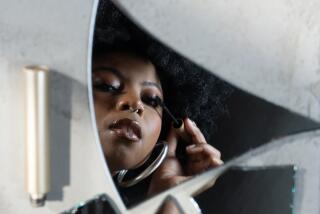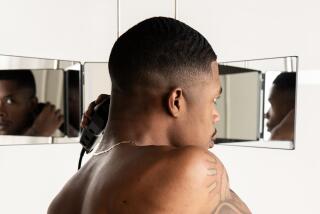BY DESIGN : Taking Pride In Natural Beauty : Lifestyles: When it comes to hair, many African American women are ignoring potions and preparations --and in the process redefining their self-images.
- Share via
Never have there been so many ways for African American women to straighten their hair.
Beauty supply stores and hair-care sections of drugstores are stocked full of perm kits, relaxers and other products. The niche is big business.
Still, many African American women ignore all the preparations, potions and techniques that promise to give them what nature didn’t. Instead, they are opting for styles--from afros to corkscrew twists--that celebrate the way their hair grows naturally.
Natural hairstyles are nothing new. Before the invention of the pressing comb and other straightening methods, African Americans didn’t tamper with the texture of their hair. But more recently, a fresh approach to, and appreciation for, unprocessed hair has surfaced, as seen in a small but growing number of salons that specialize in such styles.
While some women simply like the appearance and convenience of natural styles, for others they hold a deeper meaning. For these women, natural hair is freedom from the strictures of a beauty standard that has long excluded African Americans. It is a conscious redefinition of what it means to be beautiful.
“We will bleach our skin, put in blue contacts, anything to get away from who we are,” said Lorita Williams. “It’s a shame what the media has done to black beauty.”
Williams, an IBM program manager from New York, wore an afro in the ‘60s, but “in the ‘70s I lost my mind and had a perm,” she said. The ‘80s found her natural again--this time, she vows, for good. “This is who I am, this is who you’ve got to deal with, this is what it is,” she said. “I want people to get past what I look like and listen to what I have to say, to what I bring to the table.”
When it comes to texture, black hair runs the spectrum, from straight to wavy to curly to nappy. But in a world that celebrated white features--fair skin and straight hair--nappy hair and other African features were not always valued. Hair texture has historically been a tangly issue--one that resounds as deeply and painfully as that of skin color. Even the prideful era that proclaimed “Black Is Beautiful” did not have a lasting transformative power when it came to hair.
“We’ve been told for so long that our hair is not good,” said Rosa Green, an administrative assistant in a downtown Los Angeles bankruptcy court who recently began wearing her hair in corkscrew-like twists.
“It was a big change for me,” she said of the new style. “It was a big change for other people. I really don’t want to go back to straightening my hair. I like this. I was really tired of straightening my hair and damaging my hair through the straightening process.”
For women who may have worn straightened hair since childhood, deciding to deal with its natural state can be a big step. Those who take it often find their way to such salons as Oh! My Nappy Hair, an L.A. salon that specializes in natural hair for men and women.
“This is a path,” said Rosario Schuler, owner of Oh! My Nappy Hair. “It truly is. I just want to plant a seed. If you’re in here and you see other people getting natural hairstyles it makes you at least see that it’s OK.”
*
For Green, the response has been favorable. But on a recent business trip to Raleigh, N.C., Williams of IBM quickly noticed that the only afro around was hers. It became a topic of conversation among her African American colleagues.
“They looked at me like I had dropped from another planet,” she said. “I walked in and it was like, ‘You see her hair?’ ”
Both men and women asked her why she chose the style, Williams said. Then, she turned the tables.
“I started questioning them,” she said. “Do you see yourself, looking at me like I’m indecent because my hair is natural? Do you hear yourself? What are you saying about us?”
In Los Angeles, natural styles may be more common than in the South, but Oh! My Nappy Hair is believed to the only full-scale salon here specializing in them.
“People who had dreads had had them for years and they’d had them done by a girlfriend in somebody’s kitchen,” said Teddy Stewart of Los Angeles, as Schuler worked on her silver hair. “I said, ‘As big as this city is, there has to be a natural hair salon.’ ”
Schuler opened her first salon in Oakland six years ago and has been operating Oh! My Nappy Hair on La Brea Boulevard since April. Her stylists can serve up hairdos that require perms and presses, but they specialize in the exquisite braided styles and other unprocessed creations often seen on models in the pages of black women’s magazines.
The styles have such names as Bantu knots, corkscrews and goddess braids. Others with no names are a mix of Schuler’s creativity and the wishes of her clients--middle-aged professionals, twentysomething artistic types, college students.
“If we put half the hours we spend trying to keep our hair straight into trying to deal with it naturally we would have something beautiful,” said Schuler, whose own locks cascade regally down her back, like the leaves of a weeping willow. “We’re at the stage now where we have to learn about our hair.”
Schuler, who runs the salon with the help of daughter Erica Blevins, is part beautician, part philosopher. She melds the disciplines easily in discussions with women who sit in her chair.
“I think it goes back to being able to appreciate all God’s things,” she said. “This is God’s creation. I did not create myself or my hair. Just looking at the different textures black women have, it makes me think if there were only one texture it’d be a dull world.”
*
The women in Schuler’s shop often share the sometimes painful, sometimes funny experiences that mark their struggles with hair: the years of perming and pressing, the deluge of subtle and not-so-subtle messages from the media, and finally, the decision to break away from all that.
“I know that experience myself,” Schuler said. “I got tired of washing away my identity, tired of straightening. I figured God put the kind of hair I have on my head and why couldn’t I wear it?”
Schuler wanted a name for her salon that would indicate her specialty. She took cues from similar spots in other cities with names like Kinaps and Khamit Kinks. A few African Americans have found the name of the shop offensive, but Schuler said it’s meant as an expression of self-love and acceptance. It screams out from the front window in pink neon.
The walls of the spacious shop are covered with original art by Bay Area painter Ahmed Ali--images of women with afros and locks arrayed in regal poses. On one wall hangs a photo of Maya Angelou and an enlarged copy of her signature poem “Still I Rise.” Hand-picked antiques and hardwood floors give the place a homey feel. The radio stays tuned to an oldies station that dishes out Motown. And Schuler hopes to offer live jazz performances on Sundays.
At one time Schuler considered opening a salon that wouldn’t offer perms and presses at all, but part of the joy of her work is meeting a mix of people.
“Plus, I can’t alienate the people who wear perms,” she said. “It’s all our hair, no matter how we wear it.”
And, she said, it’s all beautiful.






